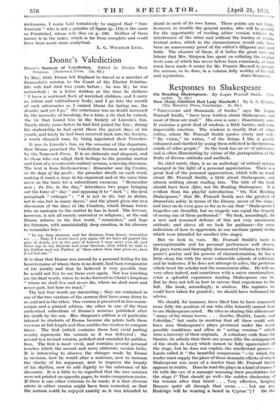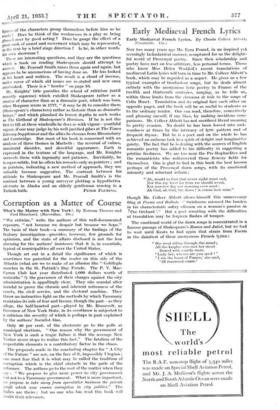Responses to Shakespeare
How Many Children Had Lady Macbeth Y By L. C. Knights. (The Minority Press, Cambridge. 2s. 6d.) " THOUSANDS and thousands of books," says Mr. Logan Pearsall Smith, " have been written about Shakespeare, and most of them are mad." His own is sane ; disastrously sane. It contains a great deal of wisdom, a little banter, and some impeccable emotion. The wisdom is mostly that of other critics, whom Mr. Pearsall Sniith quotes wisely and well: " My vision," he writes, " of the things I like is greatly enhanced and clarified by seeing them reflected in the luminous minds of other people." So the book has an air of substance, and is often illuminating by virtue of the juxtaposition of the fruits of diverse outlooks and methodi.
Its chief merit, thcn, is as an anthology of critical opinion arranged in the light of a personal appreciation. There is a great deal of the personal appreciation, which tells us much about Mr. Pearsall Smith, a little about Shakespeare, and almost nothing about reading him. The title of the book should have been After, not On Reading Shakespeare. It is evident from his playful introduction " On Not Reading Shakespeare," that Mr. Pearsall Smith sees the greatest of dramatists solely in terms of the library, never of the stage ; and later on he even goes so far as to say that " Shakespeare's tragedies are dreadful, but no tragedy can equal the tragedy of seeing one of them performed." We look, accordingly, for a new and reasoned defence of this not very uncommon attitude, and above all we look for guidance—for some indication of how to appreciate in one medium (print) works which were intended for another (the stage).
But we look in vain. Mr. Pearsall Smith's taste is unexceptionable and his personal preferences well chosen. He pays warm and thoroughly documented tributes to Shakes- peare's poetry and his powers of characterization, he has a little clean fun with the more vulnerable schools of criticism, and he indicates, if he does not attempt to solve, the problems which beset the scholar and the connoisseur alike. He tells us, very often indeed, and sometimes with a naive emotionalism, what a splendid experience reading Shakespeare can he. But he does not tell us how to savour that experience to the full. His book, accordingly, is aimless. His raptures we could have taken for granted ; we should have welcomed his advice.
We should, for instance, have liked him to have examined more fully the position of one who (like himself) cannot bear to see Shakespeare acted. He cites as sharing this abhorrence " many of his wisest lovers. . . . Goethe, Hazlitt, Lamb, and Coleridge," but omits to mention that all these could only have seen Shakespeare's plays produced under the worst possible conditions and often in " acting versions " which were a travesty of their originals. A voluntary exile from the theatre, he admits that there are scenes (like the arraignment of the stools in Lear) which cannot be fully appreciated off the stage, but he does not explain the intellectual-process- Lamb called it " the beautiful compromise "—by which the reader must supply the place of those dramatic effects of which Shakespeare was more .of a master than Mr. Pearsall Smith appears to realize. Does he read the plays in a kind of trance ? Or with the eye of a manager assessing their possibilities for the stage (" That should go well—the sudden slackening of .the tension after that brawl . . . Very effective, keeping Banquo quiet all through that scene. . . . Let one see, Roderigo will be wearing a beard in Cyprus ") ? Do the figures of the characters group themselves before him as he reads ? Does he think of the weaknesses in a play as being glossed over by good acting ? Does he gauge the effect of a Feat rush of sound and movement which may be represented, in the text by a brief stage direction ? Is he, in other words his own showman ?
These are interesting questions, and they-are the questions which a book on reading Shakespeare should attempt to answer. Mr. Pearsall Smith raises them again and again, but appears to be unconscious of having done so. He has looked in his heart and written. The result is a cloud of incense, under cover of which old issues are re-stated and new ones overlooked. There is a " howler " on page 10.
Mr. Knights' title parodies the school of criticism (until recently supreme)- which extolled Shakespeare rather as a creator of character than as a dramatic poet, which was born when Morgann wrote in 1777, " it may be fit to consider them (Shakespeare's characters) rather as historic than as dramatic beings," and which plumbed its lowest depths in such works as The Girlhood of Shakespeare's Heroines. If he is not the first to tilt at these windmills he does so with vigour—youthful vigour, if one may judge by his well-justified gibes at The Times Literary Supplement and the allies he chooses from Bloomsbury and Cambridge. But most of his book is concerned with an analysis of three themes in. Macbeth : the reversal of values, unnatural disorder, and deceitful appearance. Each is expressed in the texture of the language, and Mr. Knights unravels them with ingenuity and patience. Inevitably, he is super-subtle, but he offers his remarks only as pointers ; and as pointers, indicating a new method of approach, they are valuable because suggestive. The contrast between his attitude to Shakespeare and Mr. Pearsall Smith's is the contrast between a young surveyor plotting a hypothetica air-route in Alaska and an elderly gentleman musing in a







































 Previous page
Previous page